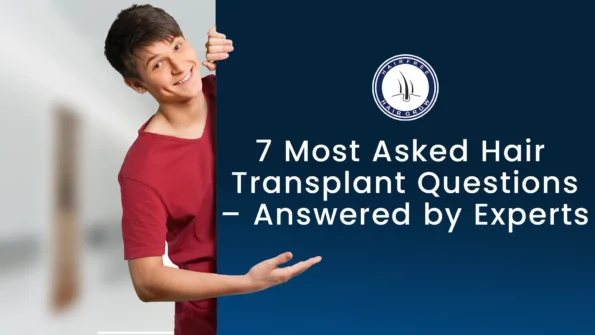“Mere bhai, transplant karwa le – pura look change ho jayega!”
If you’ve heard something like this from a friend or seen amazing hair restoration makeovers online, you’re not alone. In today’s Insta-perfect world, hair loss isn’t just a medical concern it’s an emotional one. And the idea of getting back a full head of hair sounds like a dream come true.
But let’s be honest—when it comes to hair transplants, most people are flooded with confusion.
- Will it hurt?
- Will it last?
- Will I look like a porcupine gone wrong?
That’s where facts beat fear. In this blog, we’ve gathered the 7 most asked hair transplant questions, answered by real experts—without jargon, false promises, or marketing fluff.
So whether you’re browsing for your dad, searching for yourself, or just curious about how Shah Rukh-level hairlines are possible again, we’ve got you covered.
Let’s get into the truth behind the transformation.
Question 1: What Results Can I Expect from a Hair Transplant?
- Transplanted hair grows permanently, just like the original.
- It can be cut, styled, and treated like normal hair.
- Results start to become visible in 3–6 months, with full growth in 12–18 months.
Question 2: How much does a hair transplant cost in India?
- Number of grafts
- Technique used (FUT vs FUE)
- Clinic’s reputation and location
- Surgeon’s experience
Question 3: Do I Still Need Medical Therapy After a Hair Transplant?
Short Answer: Yes, in most cases.
A hair transplant↗️ restores hair in areas where you’ve lost it, but it doesn’t stop future hair loss. Medications like Minoxidil (Rogaine) or Finasteride (Propecia) are often recommended after surgery to maintain your existing hair and prevent further thinning.
If you skip medical therapy, you risk losing your non-transplanted hair around the newly implanted follicles which can affect the overall look of your transplant.
Medical therapy helps:
- Reduce shock loss
- Slow progressive hair thinning
- Maximize the long-term success of the transplant
Duration? As long as you want to maintain and protect your results.
Question 4: Can You Use Hair From Other Parts of the Body?
Short Answer: Sometimes, but it’s not ideal.
While scalp hair↗️ (from the back of your head) is the gold standard for hair transplants, body hair↗️ can be used in specific cases where scalp donor hair is limited. Common alternative donor sites include:
- Neck
- Chest
- Beard
- Occasionally, other areas like arms or pubic region
However, body hair is less predictable, often has a shorter growth cycle, and doesn’t blend as naturally with scalp hair. It’s mainly used as a last resort or to add density in certain zones not as the primary donor source.
Also, scarring and healing are often less favorable in body areas, especially the chest.
Question 5: Is There a Minimum or Maximum Age for Hair Transplant?
Short Answer: Not exactly but it depends on the case.
Minimum Age: In general, you must be at least 18 years old to consent to elective procedures like hair transplant. But even then, most experts caution against early intervention, unless the patient has an aggressive condition (like advanced androgenic alopecia) or a reconstructive need (e.g. burns or trauma).
Patients under 25 may still be experiencing active hair loss, making it tricky to plan a long-term transplant strategy.
Maximum Age: There is no upper age limit. Patients even in their 70s or 80s can be eligible if:
- They are in good health
- They have a stable donor area
- Their goals are realistic
The key is personalized assessment not just age.
Question 6: Will I Have Scars After Hair Transplant Surgery?
Short Answer: Yes but they can be minimal.
There’s no such thing as scarless hair transplant. All surgical methods leave scars the difference is in how visible they are.
- FUT (Strip Method): Leaves a linear scar at the back of the head. Not suitable if you want to keep short hairstyles.
- FUE (Follicular Unit Extraction): Leaves tiny dot scars, which are less noticeable and heal better especially when done by an experienced surgeon.
Poor technique, oversized punches, or dense harvesting can lead to visible scarring, thinning, or patchy donor areas. Always choose a qualified, ethical hair transplant clinic that uses refined tools and prioritizes natural results.
Bonus Tip: Always Ask These Before Committing to Surgery
- How experienced is the surgeon with FUE/FUT?
- Will your hairline look natural in 5, 10, 20 years?
- Is your donor area strong enough?
What’s the long-term hair maintenance plan?
Conclusion
Hair transplant surgery↗️ is a powerful solution for hair loss but it’s not magic. You need to understand the facts, set realistic expectations, and invest in the right treatment plan that includes both surgery and post-operative care.
By answering these 7 most asked hair transplant questions, we hope you’re better informed and confident in making the right decision for your hair.
Looking for a Trusted Hair Transplant Clinic?
At Hairfree & Hairgrow Clinic↗️, our experienced surgeons offer personalized hair restoration plans using the most advanced FUE and FUT techniques, backed by years of clinical success and satisfied patients. From planning your hairline to preserving your results, we’re here for your complete hair journey.
- Transparent consultation
- Advanced technology
- Ethical advice and honest guidance
Book a consultation today and get expert answers tailored to your case.
Written By
MD (Skin & VD)
Most common hair transplant questions & answers by experts, here is our expert Dr. Santpal Sangwan, where you can ask your questions and get answers.
Disclaimer
We’ve made all possible efforts to ensure that the information provided here is accurate, up-to-date and complete, however, it should not be treated as a substitute for professional medical advice, diagnosis or treatment. See Detailed Disclaimers Here.


